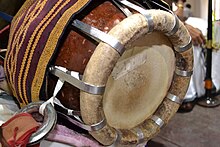Thavil
This article needs additional citations for verification. (November 2011) |
A thavil (Tamil:தவில்) or tavil is a barrel-shaped percussion instrument from Tamil Nadu. It is also widely used in other South Indian states (Andhra Pradesh, Karnataka, Kerala, Telangana) as well as in the North and East of Sri Lanka (in the Tamil majority area called Tamil Eelam). It is used in temple, folk and Carnatic music, often accompanying the nadaswaram. The thavil and the nadaswaram are essential components of traditional festivals and ceremonies in South India.

In folk music contexts, a pair of wider, slimmer sticks are sometimes used. Thanjavur is famous for thavil, so called Thanjavur Thavil. In Tamil Filmi songs thavils are mostly used, Notable movies: "Thillaanaa Mohanambal", "Paruthiveeran", "Karagattakaran", "Sarvam Thaala Mayam".

History
[edit]Thavil is a traditional musical instrument of the ancient city of Thanjavur in Tamil Nadu. It is an integral part of the Carnatic music in Thanjavur. It is mostly made in Thanjavur and Valayapatti.
Physical components
[edit]The thavil consists of a cylindrical shell hollowed out of a solid block of jackfruit wood. Layers of animal skin (water buffalo on the right, goat on the left) are stretched across the two sides of the shell using hemp hoops attached to the shell. The right face of the instrument has a larger diameter than the left side, and the right drum head is stretched very tightly, while the left drum head is kept loose to allow pitch bending. The larger face is higher in pitch than the smaller face.
The modern Thavil has a corpus that is bordered by a steel ring coated in plastic on which the two skins are fixed by metal straps. Both skins can be separately tuned.[1]
Methods of use and posture
[edit]The instrument is either played while sitting, or hung by a cloth strap (called nadai) from the shoulder of the player. The right head is played with the right hand, wrist and fingers. The player usually wears thumb caps on all the fingers of the right hand, made of hardened glue from maida flour. The left head is played with a short, thick stick made from the wood of the portia tree. It is not uncommon for left-handed players to use the opposite hands, and some nadaswaram groups feature both a right- and a left-handed thavil player.[citation needed]
Veteran thavilists
[edit]Some master thavil players:[2]
- Thirumulaivayil Muthuveer pillai
- Thirumulaivayil Shanmugavadivel pillai
- Valangaiman A. Shanmugasundaram Pillai
- Kalaimamani Thirucherai.T.G.Muthukumaraswamy Pillai
- Valayapatti A. R. Subramaniam
- Haridwaramangalam A. K. Palanivel
- Vellore Dr. P.R.M. Venkateshan
- Dakshinamoorthy - Jaffna or Yaazhpaanam, Shri Lanka
- Needamangalam Meenakshi Sundaram Pillai
- Thirunageshwaram Subramanian Pillai
- Bhusurapalli Adisheshaiah
- Iluppur Panchami
- Kumbakonam Thangavel Pillai
- Natchiarkoil Raghava Pillai
- Needamangalam Shanmugavadivel
- Valangaiman Shanmugasundaram Pillai
- Thiruvalaputhur T A Kaliyamurthy
- Tanjore T R Govindaraj
- Shanmugam Thavil - Puducherry
- Thiruppungur T G Muthukumarasamy
- Mannaarkudi Thiru M.R.Vasudevan
- Thirumaignanam Narayanasamy Pillai
- Valiyambakkam V.M Ganapathy
- Gurumurthy Pandithar - Adelaide
References
[edit]- ^ "South Indian Thavil". indian-instruments.com.
- ^ "Official Web Site of Saneetha Nataka Academy - List of Saneetha Nataka Academy Award Winners". Archived from the original on 30 May 2015.
